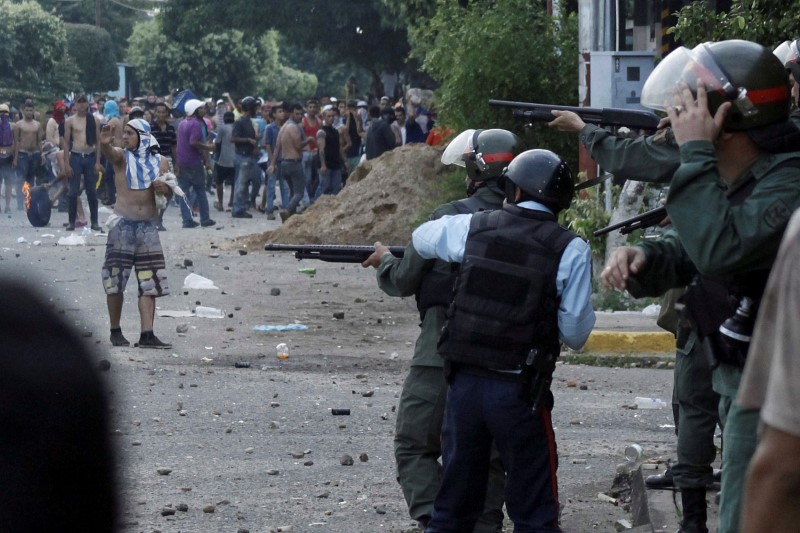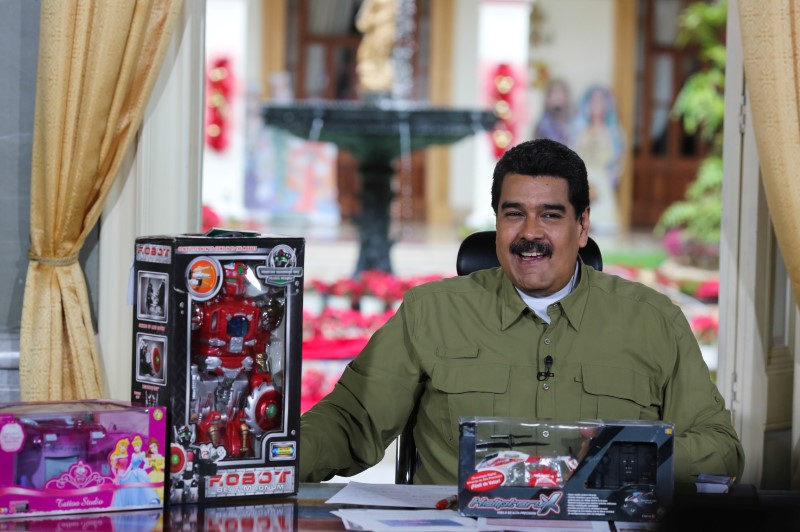
By Andrew Cawthorne and Alexandra Ulmer
CARACAS (Reuters) – Venezuela’s powerful Vice President Tareck El Aissami on Tuesday called his blacklisting by the United States on drug charges an “imperialist aggression” in the first bilateral flare-up under the administration of U.S. President Donald Trump.
“We shall not be distracted by these miserable provocations,” he added in a series of tweets. “Truth is invincible and we will see this vile aggression dispelled.”
The U.S. Department of Treasury on Monday sanctioned El Aissami and Samark Lopez, whom it identified as his associate, on accusations of masterminding an international network shipping drugs to Mexico and the United States.
Lopez also said the listings appeared politically motivated.
“Mr. Lopez is not a government official and has not engaged in drug trafficking,” he said in a statement on his website describing himself as a “legitimate businessman.”
President Nicolas Maduro’s government has frequently cast U.S. and opposition accusations of drug-trafficking, corruption and human rights abuses as a false pretext to justify meddling in Venezuela and a push to topple him.
Maduro, 54, narrowly won election in 2013 to replace the late Hugo Chavez, but his popularity has plummeted amid an economic crisis in the nation of 30 million people.
Though he frequently lashed out at former U.S. leader Barack Obama, the Venezuelan president has so far refrained from criticizing Trump.
The sanction on El Aissami will dent Maduro’s hopes Trump might avoid confrontation with Venezuela but could also help him by providing a nationalist card to play, said Tulane University academic and Venezuela expert David Smilde.
“This is a tremendous gift to Maduro as it ensures El Aissami’s loyalty. It essentially increases El Aissami’s exit costs and gives him a personal stake in the continuation of ‘Chavismo’,” he said.
“To be clear, El Aissami and others should be held responsible for their actions. However it should be understood this process has pernicious unintended consequences. I think we are effectively witnessing the creation of a rogue state.”
“CRIMINAL” STATE?
El Aissami, 42, whom local media report is of Syrian and Lebanese extraction, grew up poor in the Andean state of Merida and went on to study law and criminology, according to the ruling Socialist Party. He had been both a lawmaker and a state governor before being named vice president last month.
Venezuelan opposition groups have long accused El Aissami of repressing dissent, participating in drug trafficking rings, and supporting Middle Eastern groups such as Hezbollah.
The head of Venezuela’s Democratic Unity opposition coalition, Jesus Torrealba, said on Tuesday that the El Aissami case demonstrated the rotten and “criminal” nature of the state.
Another opposition leader, Henry Ramos, scoffed that Venezuela would no doubt claim drugs had been planted on officials “just like they plant evidence on Venezuelan opponents to make them rot in the regime’s jails.”
Venezuela is holding more than 100 activists in prison, according to local rights groups. The government denies the existence of political prisoners, saying all politicians in jail are there on legitimate charges.
A senior U.S. official said on Monday that El Aissami controlled drug routes by air and sea. The Treasury Department said he oversaw or partially owned narcotics shipments of more than 1,000 kilograms (2,200 pounds)from Venezuela on multiple occasions.
Another U.S. administration official estimated the value of property in Miami linked to El Aissami but now blocked was worth tens of millions of dollars.
The move was a departure from the so-called “soft landing” approach taken by Obama’s White House. At times it had clashed with efforts by the U.S. Justice Department and Drug Enforcement Administration, which worked with informants in Venezuela to nab influential officials for money laundering and drug trafficking.
Since 2015, the Obama administration had sought to use behind-the-scenes diplomacy to ease acrimony with Caracas and the fallout of a string of U.S. drug indictments against Venezuelan officials, such as Interior Minister Nestor Reverol.
“When the right wing attacks us, it shows we are advancing. Nothing and nobody will stop our victorious march to peace,” Reverol tweeted in defense of El Aissami.
(Additional reporting by Diego Ore in Caracas, Lesley Wroughton in Washington; Writing by Andrew Cawthorne; Editing by W Simon; Editing by Lisa Von Ahn)










